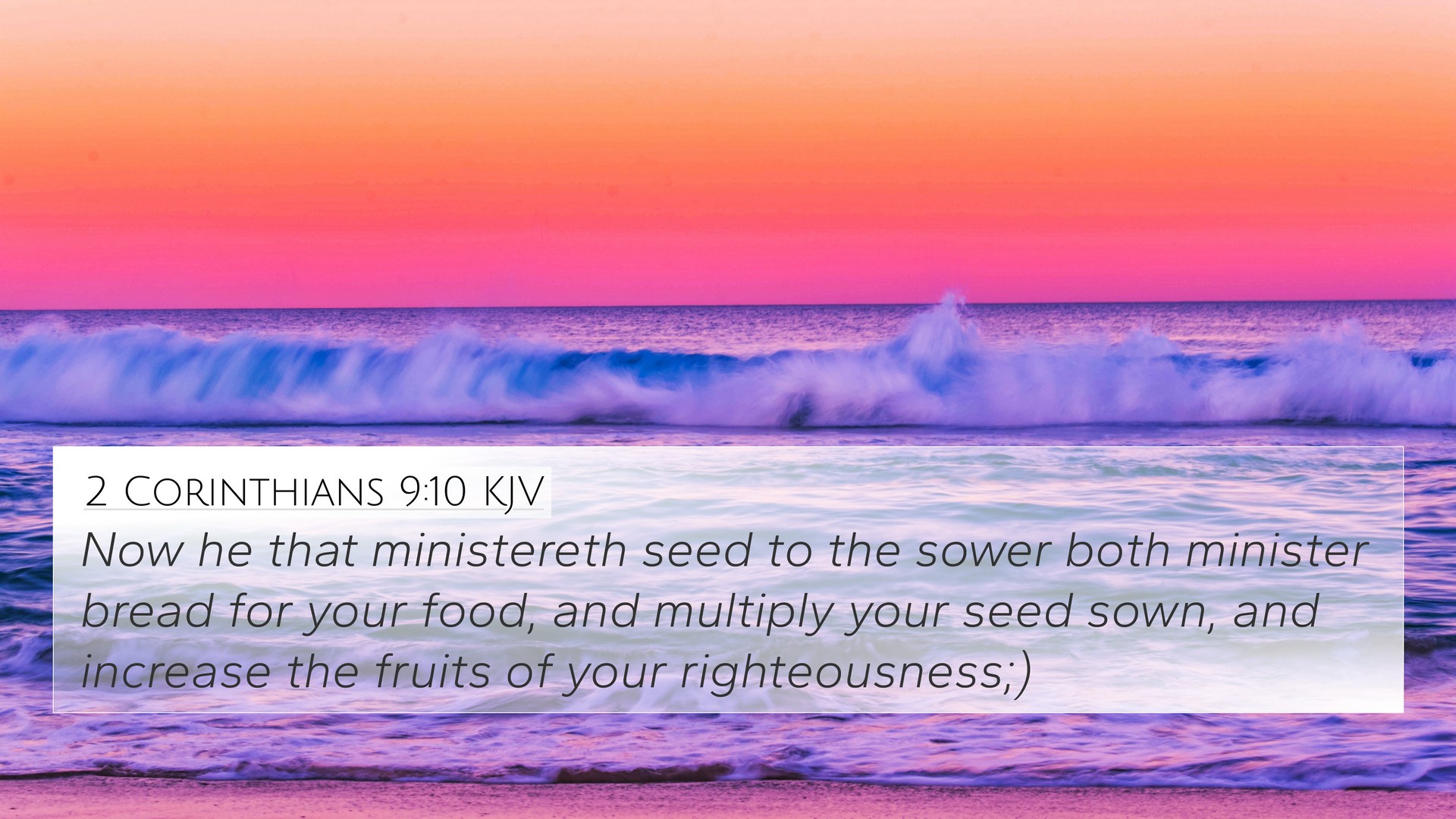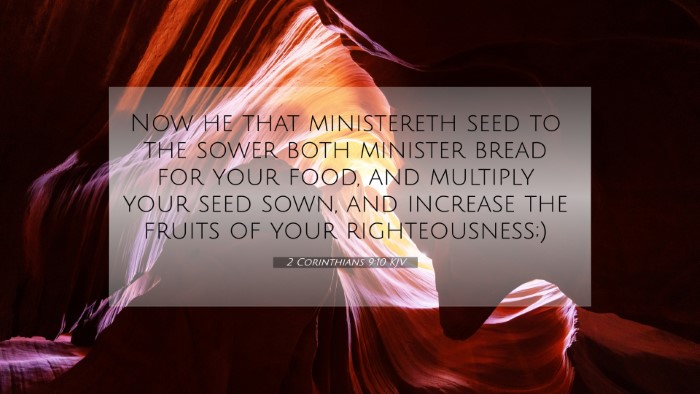Old Testament
Genesis Exodus Leviticus Numbers Deuteronomy Joshua Judges Ruth 1 Samuel 2 Samuel 1 Kings 2 Kings 1 Chronicles 2 Chronicles Ezra Nehemiah Esther Job Psalms Proverbs Ecclesiastes Song of Solomon Isaiah Jeremiah Lamentations Ezekiel Daniel Hosea Joel Amos Obadiah Jonah Micah Nahum Habakkuk Zephaniah Haggai Zechariah Malachi2 Corinthians 9:10 Similar Verses
2 Corinthians 9:10 Cross References
Now he that ministereth seed to the sower both minister bread for your food, and multiply your seed sown, and increase the fruits of your righteousness;)
Uncover the Rich Themes and Topics of This Bible Verse
Listed below are the Bible themes associated with 2 Corinthians 9:10. We invite you to explore each theme to gain deeper insights into the Scriptures.
2 Corinthians 9:10 Cross Reference Verses
This section features a detailed cross-reference designed to enrich your understanding of the Scriptures. Below, you will find carefully selected verses that echo the themes and teachings related to 2 Corinthians 9:10 KJV. Click on any image to explore detailed analyses of related Bible verses and uncover deeper theological insights.
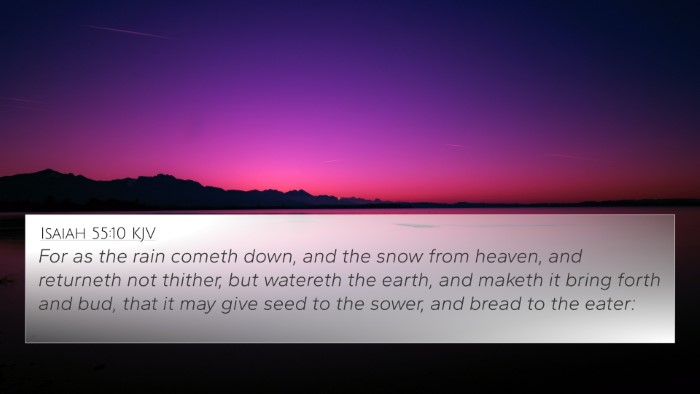
Isaiah 55:10 (KJV) »
For as the rain cometh down, and the snow from heaven, and returneth not thither, but watereth the earth, and maketh it bring forth and bud, that it may give seed to the sower, and bread to the eater:

Hosea 10:12 (KJV) »
Sow to yourselves in righteousness, reap in mercy; break up your fallow ground: for it is time to seek the LORD, till he come and rain righteousness upon you.

2 Corinthians 9:6 (KJV) »
But this I say, He which soweth sparingly shall reap also sparingly; and he which soweth bountifully shall reap also bountifully.

1 Thessalonians 3:12 (KJV) »
And the Lord make you to increase and abound in love one toward another, and toward all men, even as we do toward you:

Philippians 1:11 (KJV) »
Being filled with the fruits of righteousness, which are by Jesus Christ, unto the glory and praise of God.

Matthew 6:1 (KJV) »
Take heed that ye do not your alms before men, to be seen of them: otherwise ye have no reward of your Father which is in heaven.
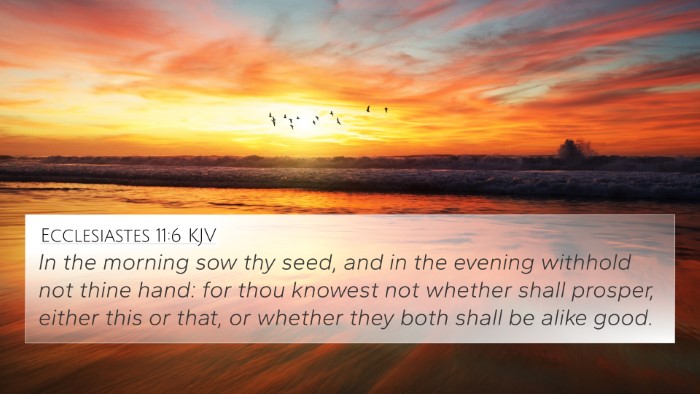
Ecclesiastes 11:6 (KJV) »
In the morning sow thy seed, and in the evening withhold not thine hand: for thou knowest not whether shall prosper, either this or that, or whether they both shall be alike good.

Proverbs 11:18 (KJV) »
The wicked worketh a deceitful work: but to him that soweth righteousness shall be a sure reward.
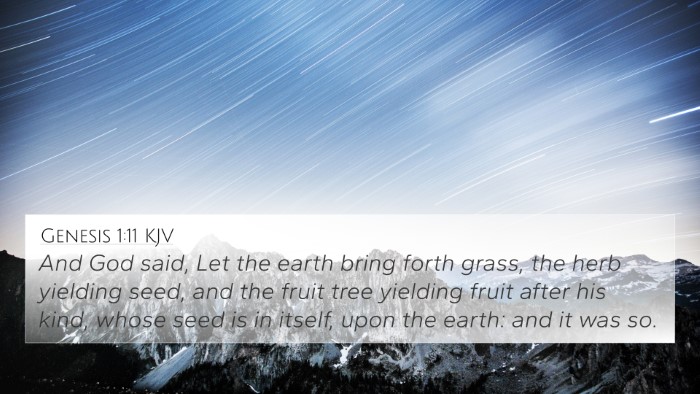
Genesis 1:11 (KJV) »
And God said, Let the earth bring forth grass, the herb yielding seed, and the fruit tree yielding fruit after his kind, whose seed is in itself, upon the earth: and it was so.

Philippians 4:17 (KJV) »
Not because I desire a gift: but I desire fruit that may abound to your account.

Genesis 47:19 (KJV) »
Wherefore shall we die before thine eyes, both we and our land? buy us and our land for bread, and we and our land will be servants unto Pharaoh: and give us seed, that we may live, and not die, that the land be not desolate.

Genesis 47:23 (KJV) »
Then Joseph said unto the people, Behold, I have bought you this day and your land for Pharaoh: lo, here is seed for you, and ye shall sow the land.

1 Thessalonians 4:10 (KJV) »
And indeed ye do it toward all the brethren which are in all Macedonia: but we beseech you, brethren, that ye increase more and more;
2 Corinthians 9:10 Verse Analysis and Similar Verses
Understanding 2 Corinthians 9:10
Verse: "Now he who supplies seed to the sower and bread for food will supply and multiply your seed for sowing and increase the harvest of your righteousness." (2 Corinthians 9:10)
Summary: This verse emphasizes God's role as the ultimate provider who not only supplies material resources but also spiritual growth in the believer's life. The analogy of seed represents both the physical and spiritual resources entrusted to believers.
Commentary Insights
Matthew Henry's Commentary
Henry highlights the agricultural metaphor used in this verse, where God is portrayed as the giver of both "seed" and "bread." This indicates that God provides both the means for our temporal needs and the nourishment for our spiritual lives. The "seed" symbolizes the opportunities and resources we have to serve and the growth of righteousness that follows. It is by God's provision that believers can engage in good works that yield spiritual fruit.
Albert Barnes' Notes
Barnes focuses on the promise that God will not only supply but also multiply the resources given to believers for their ministry. He explains the dual aspects of God's provision: supplying what is necessary for everyday sustenance (bread) and the spiritual gifts that yield a fruitful life. He encourages the faithful to view their giving as not merely a duty but an opportunity for God’s blessings to overflow, resulting in a "harvest of righteousness."
Adam Clarke's Commentary
Clarke notes that the "seed" signifies both the ability to give and the outcomes of that giving. This verse assures believers that as they sow their resources—whether time, talent, or treasure—God will enhance those efforts, leading to a greater abundance in righteousness. The correlation between sowing and reaping underscores the divine principle that generosity results in spiritual prosperity.
Biblical Cross-References
This verse corresponds with several other passages that discuss themes of provision, generosity, and spiritual growth:
- Genesis 1:29: God provides seed-bearing plants for food.
- Luke 6:38: "Give, and it will be given to you..." encapsulates the reciprocal nature of giving.
- Galatians 6:7-9: "Whatever one sows, that will he also reap," discussing the law of sowing and reaping.
- Philippians 4:19: Assurance that God will supply every need of yours according to His riches.
- Proverbs 11:25: "Whoever brings blessing will be enriched," linking generosity with divine reward.
- Matthew 5:6: "Blessed are those who hunger and thirst for righteousness..." indicating spiritual fulfillment from God.
- 2 Timothy 2:6: "The hardworking farmer ought to be the first to share in the crops," reinforcing labor and reward.
Thematic Insights
This verse and its commentaries reveal several interrelated themes in Scripture:
- Divine Provision: God's continuous support in both physical and spiritual realms.
- Sowing and Reaping: The principle that our acts of generosity will result in corresponding rewards.
- Spiritual Growth: A deeper understanding of how generosity contributes to the righteousness cultivated in our lives.
- Faithfulness in Giving: Encouragement to see giving as a significant aspect of faithfulness to God.
Practical Applications
Believers can apply the truths of 2 Corinthians 9:10 through various means, including:
- Intentional Giving: Be proactive in selecting how and what to give for ministry efforts.
- Prayer for Provision: Seek God's guidance on how to use resources for His glory.
- Encouraging Others: Inspire fellow believers to participate in acts of giving and service.
- Biblical Reflection: Regularly meditate on scripture that speaks to God's provision and encouragement in generosity.
Conclusion
In conclusion, 2 Corinthians 9:10 serves as a powerful reminder of God's role as the supplier of all good things. Through our acts of sowing—whether it is time, talents, or treasures—believers are assured that God not only meets our needs but multiplies our efforts to produce a rich harvest of righteousness. As we reflect on supporting verses and apply their wisdom, we deepen our understanding of the interconnectedness of the Bible, enhancing our spiritual lives.
SEO Keywords Connection
This analysis highlights various Bible verse cross-references and the connections between Bible verses as seen in the thematic flow of biblical teachings. For example, linking Bible scriptures from the Old Testament to the New Testament reinforces our understanding of God's continuity in provision across scripture.
